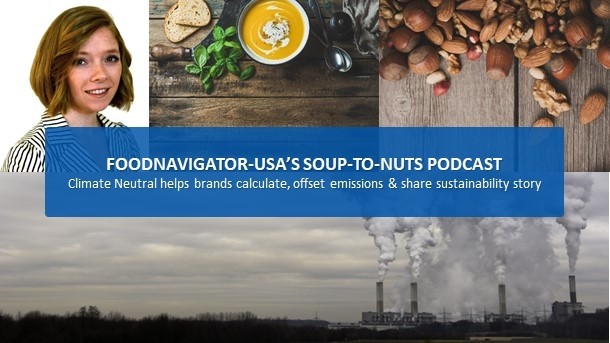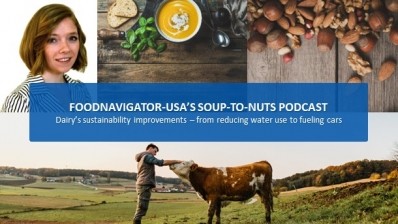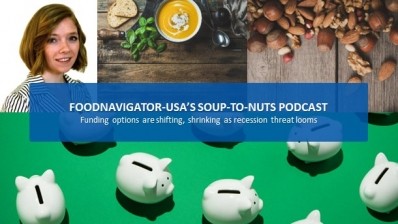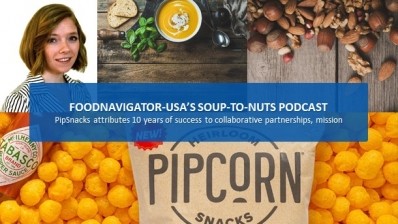Soup-To-Nuts Podcast: Climate Neutral helps brands calculate, offset emissions & tell sustainability story

According to NielsenIQ’s Global Health & Wellness study fielded last fall and presented last week at Food Edge’s 2022 Summit, a third of US consumers are more likely to buy products with sustainable credentials – triggering a 16.5% uptick in environmental sustainability claims and certifications on package in the past two years. Among these, include a 60.3% increase in carbon free claims, a 37.6% jump in renewable energy claims, 36.7% increase in claims about less emissions, and a 29.8% and 17.5% increase in zero waste and sustainably certified claims, respectively.
While powerful purchase drivers, earning and responsibly communicating environmental sustainability successes without breaking the bank can be overwhelming, if not impossible, to do alone, which is where organizations like the nonprofit Climate Neutral come into play.
In this episode of FoodNavigator-USA’s Soup-To-Nuts podcast, Austin Whitman, the CEO of Climate Neutral, shares how his independent organization is helping brands access the tools and networks they need to measure, offset and ultimately reduce their entire carbon footprint. He also explains why undertaking this process is essential now – both for the planet and for brands’ economic success. And finally, he shares marketing strategies to maximize the impact of companies’ environmental work without confusing consumers or falling prey to greenwashing and value of having a reputable certification.
[Editor’s Note: Never miss an episode of FoodNavigator-USA’s Soup-To-Nuts podcast – subscribe today.]
The time to act is now, not in 30 years
Climate Neutral was founded on the premise that urgent action is needed to address climate change and that being accountable for carbon should be the new normal for responsible businesses. And while the founders believe that calculating and offsetting footprints is “remarkably easy and surprisingly affordable” they also recognized that the carbon conversation is “really complicated” even though it “fundamentally doesn’t have to be.”
Part of what makes the carbon conversation confusing or intimidating for many businesses and individuals is the swirl of information and disinformation that surrounds the topic, making it difficult to understand the full extent of climate change, the speed at which it is progressing and why immediate action – not just goals with a 20, 30 or even 50 year horizon – is necessary.
To better understand the need for change, Whitman said he likes to think about the evolution of climate change not within the context of the planet’s long life, but his own short one.
“In my lifetime, carbon emissions have increased 100% globally. And that’s from basically the late ’70s until now. And in my careers, they’ve increased 30%, which is basically since 200, the last 20 years,” he said.
At this rate, the climate models say many places will be unlivable or highly disrupted as we are headed towards 3.5 to 4 degrees Celsius above historic ranges, he added.
To reverse this, carbon emissions need to fall somewhere on the order of 8-9% per year, representing a 10-11% difference in the trajectory between what we need and what we have, he said.
Sustainably marketed products are growing 5 to 6 times non-sustainable options
Slowing and potentially reversing climate change for the sake of the planet and future generations isn’t the only reason that Whitman says businesses should act now to track, offset and reduce their emissions – they should also do so for their bottom line.
He explains that from a business perspective, companies focused on environmental sustainability are responding to a carrot and a stick. On the reward side, sustainability is a sales driver with consumers increasingly buying more from environmentally-conscious companies. And the stick is coming from employees and investors who increasingly are walking away from companies that are not advancing sustainability.
“Sustainably marketed products are growing five, six times non-sustainably marketed products… and they are more resilient in economic downturns,” which is a convincing argument for embracing this trend on a financial basis, Whitman said.
“We’ve also seen it really strongly in the form of employee pressure on companies to do more about climate change to the point where people who are interviewing for jobs are asking the hiring manager,” he noted.
In response, some companies and investors are starting to break off relationships with others that are not acting sustainably or whose behavior impacts their footprints negatively.
Seizing the opportunity with Climate Neutral
Given the size of the prize for adopting more sustainable practices and the reputational and financial threat of not – why aren’t more companies taking action and talking about it in their marketing?
One reason, Whitman says, is because they’ve overthought it and psyched themselves out.
To help companies overcome their fears and better understand what it takes to reduce their emissions, Whitman says, Climate Neutral created a three-step roadmap and set of tools to “democratize the information that companies need to start taking immediate action.”
He explained: “Most companies are perplexed about what to do about and probably overestimate how much cost and how much time would be required.”
And so, Climate Neutral sought to make action easier by creating a roadmap and a label akin to USDA Organic Certified, which could also engage consumers and drive business, Whitman said. This model allows the nonprofit to work with a hundred brands for the same price and effort as one brand working with a consultant.
Step One: Measure
To make this information as easy to understand and act on as possible, Climate Neutral breaks its certification process into three steps – measure, offset and reduce – that are developed around peer-reviewed standards
The first step, measuring, may sound complex and resource-intensive, but Whitman said it only takes one to two hours for small brands and one to three months for larger brands, including data aggregation, in part because Climate Neutral’s software tool – the Brand Emissions Estimator, or “BEE,” streamlines everything.
Step Two: Offset
Once companies know the extent of their emissions, Climate Neutral helps them identify how to offset and eventually reduce them, which Whitman acknowledges is the opposite order from that most other players in the space act.
“The first thing that any company should do is compensate for historical emissions while they’re working on reducing future emissions … because of the urgency of the problem,” Whitman argued.
Step Three: Reduce
When it comes to reducing emissions, Climate Neutral encourages companies to take a long-view and to address first low-hanging fruit while it works towards larger, more complicated and longer-term goals.
It also understands that companies of different sizes and at different development stages have more or fewer resources at their disposal, which is why the nonprofit creates a sliding scale for reduction targets. For example, companies with over $100m in revenue are required to meet reduction targets for 2030, while those making between $5m and $100m are strongly encouraged to do so but not required.
Maximizing the impact
Once companies complete Climate Neutral’s three-step process, the non-profit ensure they get the credit they are due by helping them craft an accessible marketing message around their efforts.
“The certification is something that takes on different meaning as companies grow. And as companies go along the journey, and so the first year for certification, we enable them to do marketing around the exciting fact that they've gotten certified and what it means,” Whitman said.
In subsequent years, Climate Neutral helps brands articular different aspects of their story in a way that consumers can understand, including complex topics like climate neutral, net zero carbon, etc., and in a way that is upbeat and hopeful.
Already working with more than 350 brands, Climate Neutral is eager to expand its impact with a shared goal of moving the needle on climate change. For those who are interested in learning more about Climate Neutral’s certification process or who want to partner with other organizations that are already certified, check out climateneutral.org.

















